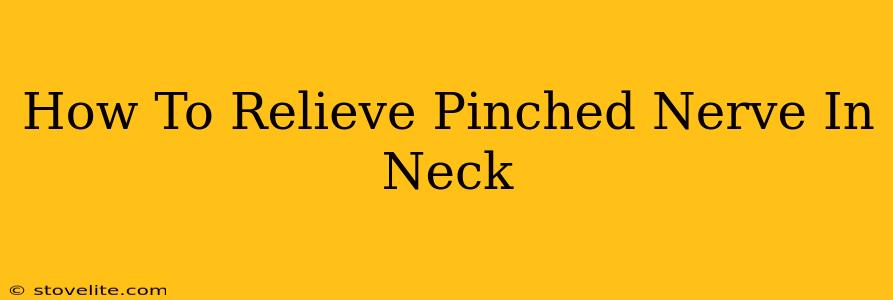A pinched nerve in your neck, also known as cervical radiculopathy, is a painful condition that can significantly impact your daily life. It occurs when pressure is placed on a nerve in your neck, often due to issues like bulging or herniated discs, bone spurs, or spinal stenosis. The resulting pain can radiate down your arm, causing numbness, tingling, and weakness. Fortunately, there are several ways to relieve a pinched nerve in your neck, ranging from at-home remedies to medical interventions.
Understanding the Cause of a Pinched Nerve
Before we dive into treatment, it's crucial to understand what causes a pinched nerve in the neck. Several factors can contribute to this painful condition:
- Herniated or Bulging Discs: These are common culprits. The soft cushions between your vertebrae can bulge or rupture, putting pressure on nearby nerves.
- Bone Spurs (Osteophytes): These bony growths can develop along the spine and impinge on nerves.
- Spinal Stenosis: This condition involves the narrowing of the spinal canal, reducing space for the spinal cord and nerves.
- Poor Posture: Maintaining poor posture for extended periods can strain your neck muscles and put pressure on nerves.
- Injury: Whiplash or other neck injuries can lead to pinched nerves.
- Degenerative Disc Disease: As we age, our discs naturally degenerate, increasing the risk of nerve compression.
Home Remedies for Neck Pain Relief
Many people find relief from a pinched nerve with conservative treatments. These include:
1. Over-the-Counter Pain Relief:
Nonsteroidal anti-inflammatory drugs (NSAIDs) like ibuprofen or naproxen can help reduce pain and inflammation. Always follow the recommended dosage.
2. Heat and Ice Therapy:
Applying heat can relax tense muscles and increase blood flow, while ice can help numb the area and reduce inflammation. Alternate between heat and ice packs for 15-20 minutes at a time.
3. Gentle Stretching and Exercise:
Specific neck stretches can help alleviate pain and improve range of motion. Consult a physical therapist or doctor for recommended exercises tailored to your condition. Avoid any movements that exacerbate your pain. Examples of gentle stretches include chin tucks and neck rotations.
4. Ergonomic Adjustments:
Improve your posture by using ergonomic chairs and ensuring your workstation is set up correctly. Maintaining good posture can significantly reduce strain on your neck.
5. Rest and Relaxation:
Avoid activities that aggravate your pain and ensure you get enough rest. Stress can worsen pain, so incorporating relaxation techniques like meditation or yoga can be beneficial.
Medical Treatments for a Pinched Nerve
If home remedies don't provide sufficient relief, you may need to explore medical interventions:
1. Physical Therapy:
A physical therapist can create a personalized exercise program to strengthen neck muscles, improve flexibility, and reduce pain.
2. Medication:
Your doctor might prescribe stronger pain relievers, muscle relaxants, or anti-inflammatory medications. In some cases, they might recommend epidural steroid injections to reduce inflammation around the nerve.
3. Surgery:
Surgery is generally considered a last resort when conservative treatments fail. Surgical options include discectomy (removing a portion of a herniated disc) or spinal fusion (fusing vertebrae together).
When to See a Doctor
You should consult a doctor if:
- Your neck pain is severe or doesn't improve with home remedies.
- You experience numbness, tingling, or weakness in your arm or hand.
- You have difficulty controlling your bowel or bladder.
- You experience significant weakness or loss of function in your arm or hand.
Disclaimer: This information is for educational purposes only and should not be considered medical advice. Always consult with a healthcare professional for diagnosis and treatment of any medical condition. Self-treating can be dangerous. They can properly diagnose the cause of your neck pain and recommend the most appropriate treatment plan.

